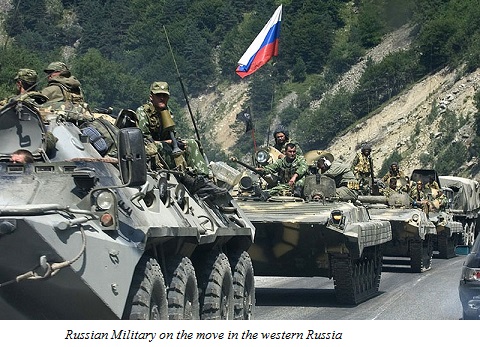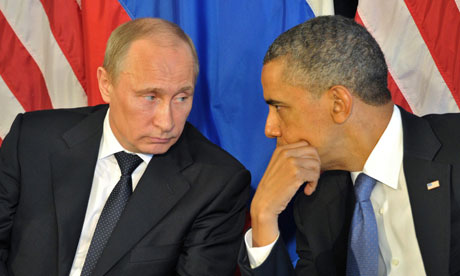CSMS Magazine
Human behavior is one of the most intriguing fields of social studies. It is not because of the complexities of our world and its sophistications, but rather because of mankind’s egocentrism. In all human endeavors, war is without question, a dangerous quest that surpasses all others. If there is one thing that can further explain this dangerous narrative, the crisis in Ukraine is certainly the one. As I’m writing this piece this evening, Ukraine, the gateway to Eastern Europe seems a country poised to disintegrate. Since the February 22nd coup that overthrew a democratically elected government, Ukraine has been on a fast track to dismemberment, triggering the most dangerous international crisis since the Cuban missile crisis of October 1962.
A neo-fascist government is installed in Kiev, but the putschists only control the western half of the country, while millions of Russian speaking Ukrainians along with scores of ethnic Russians in the east and south of the country draw their own lines in the sand, evicting government representatives sent by Kiev from all major cities in the east, including Kharkov, the country’s second largest city, the industrial city of Donetsk, Odessa, the country’s third largest city. According to French 24, a France’s 24-hour news channel, demonstrators in Donetsk demanded to hold a referendum on the future of the region, and particularly, on the status of Russian language.
Donetsk City Council approved the measure last week, a total rebuke to the coup plotters in Kiev. The council also supported the initiative on setting up municipal militia squads, like in the Crimea, to protect what he called “citizens from possible aggression by radical nationalists.” This was also reported by Itar-Tass. Furthermore, authorities decided to introduce Russian as a second official language in the region.
The City Council refused to recognize the legitimacy of the government in Kiev and declared itself the only legitimate body in the city. On Sunday, according to several news sources, a scrimmage took place between Party of Regions supporters and the newly created Volunteers’ Corps controlled by activist Pavel Gubarev, self-proclaimed “regional governor.” Addressing the crowd, Gubarev said the authorities in Kiev were illegitimate and called for the establishment of popular rule. He then urged demonstrators to set up a peaceful protest camp in front of the regional government’s office. Large demonstrations were also reported in Lugansk, Melitopol, Yevpatoria, Kerch and Mariupol.
Now, we have learned the provincial parliament of the Crimea has just voted to join Russia, further escalating an already enflamed situation. This, according to several news sources, will be official in a referendum set for March 16th.
Steven Cohen, New York University Political Science professor and an expert in US-Russia relations, asserted that the only way a catastrophe could be averted in Ukraine is a move toward federalism, “where regional governments would gain enough autonomy that no one would feel threatened by Kiev, no matter who is installed there.” Cohen went on to say that “it is inconceivable that United States and the western powers have plunged in a PR campaign on behalf of oligarchs and neo-fascists who have seized control of the Ukrainian parliament and forced out at gunpoint all delegates from the majority parties to create a charade that declared the country’s president outlawed.”
Not only the public relation campaign is well underway, but also Washington chief diplomat, former Senator John Kerry has offered to sweeten the campaign with a billion-dollar aid package for illegal and corrupt officials, half of whom are billionaire oligarchs themselves, including Sergey Taruta, appointed new governor of Donetsk Region. His fortune is estimated to be around $2 billion, putting him among the top-10 wealthiest people in Ukraine. He heads ISD, one of the biggest mining and smelting companies in the world, and also own Donetsk-based Metallurg Football Club.
In an attempt to pacify growing opposition in the east, the putschists have appointed Ukraine’s third-wealthiest man, Igor Kolomoysky as governor of Dnepropetrovsk. He is said to have amassed a fortune estimated at $2.4 billion. He co-owns the informal commercial group Privat, which includes Ukraine’s largest bank Privatbank, which Kolomoysky heads, as well as assets in the oil, ferroalloys and food industries, agriculture and transport. It is obvious these oligarchs have nothing to do with average Ukrainian whose life is as precarious as ever.
In the logic of imperial politics, power and dominance reign, and in the race to the top, only those with the might—military and financial—will eventually make it. This is to say that in bourgeois democracies, week nations, sadly so, ought to remain weak, for it is through their seemingly everlasting weakness that powerful nations thrive. They are weak precisely because their state bureaucracies and their corrupt institutions are too weak or too vulnerable to stand up against dangerous predators—declared and undeclared.
If billionaires could be plentiful in Ukraine, it is fair to say financial and industrial infrastructure clearly exist. Noticeably absent, however, is a total lack of honesty in public affairs and a blatant disregard for democratic governance and rule of law. Ukraine chronic problems and its subsequent vulnerability, however, play well into the logic of super power rivalry.
Since the breakup of the Soviet Union in 1991, weaken Russia has always been the main aim behind western foreign diplomacies; and using Ukraine to subdue Russia is a chilling example that they will stop at nothing to reach this dreaded goal. By the late 1990, Russia reemerged from its humiliating misery and began to flex the paws of its Siberian bear. As a result, the policy has been modified. Curtailing or containing Russia was and still is the height of their golden mean, even if it means pushing NATO to the very doorstep of Russia.
It is hard to imagine that Paris, Washington or London were caught by surprise, as they pretend to have been, when Vladimir Putin ordered the Russian military to move to secure the Crimea in the aftermath of the coup in Kiev—something out of which the Obama administration feigns shock and horror. “This is nothing but deceitful and cynical posturing. It knew full well that the imposition of an anti-Russian puppet regime in Kiev, controlled by the US and NATO, would be viewed by Putin and the Russian military as a massive change in the geostrategic environment in Eastern Europe and an existential threat to Russia,” affirmed Barry Grey and David North for the WS website.
How come the ideologues were unable to foresee or at the very least to expect that Russia would deploy military forces to secure its strategic and vested interests in the Crimea—a part of Russia until 1954, the home of Russia’s Black Sea fleet and its sole access point into the Mediterranean? Or that Washington knew Russia would simply turn the other cheek as they installed an extreme rightwing government in Ukraine, in which ultranationalists and Russo-phobic elements exert immense influence? A puppet regime in Ukraine, in the view of Russia, would transform the country into the new forward base for NATO forces, armed with missiles, on its very border. It threatens the strategic balance, tilting the geostrategic advantage toward the US and its European allies.
The real reasons for the current drive against Russia have nothing to do with the “national sovereignty” of Ukraine or the sanctity of international law. As this crisis looms, French forces are currently stationed in several countries of Sub Saharan Africa, Britain still maintains its sphere of influence in that same part of the world, and the United States has military bases in more than 20 countries around the world. Who is fooling whom?
US-Russian tensions have grown more intense in recent years because of Russia’s spectacular rebound, its growing clout and power in international affairs, using its wealth, its wherewithal and its military might to achieve its strategic aims. Most recently, in Syria, Russian support for the Assad regime forced the United States to carry out a temporary retreat last September and put on hold its plans for direct military intervention.
But whatever the immediate intentions of the Obama administration, the dynamic of imperial politics has a logic of its own. The western powers have provoked a situation in Ukraine in which any one of countless actions on the ground could, whether intentionally or not, trigger a chain of events that may very well spiral out of control, threaten world peace and security in the face of a possible nuclear war. The growing economic downturn in the western countries has forced their bourgeoisies into dangerous crusades to subjugate and conquer by force if necessary weak and vulnerable nations, but rich in natural resources. Even if this particular crisis is resolved, it will not take long before another one emerges. Sooner or later, one of these crises will trigger a nuclear catastrophe.
Our world needs peace, not war. Consequently, citizens of the world have a duty to denounce the western coup in Ukraine.
Also see: A Western Coup in Ukraine Sets the Stage for regional Conflagration
Note: Dr. Ardain Isma is essayist and novelist. He teaches Cross-Cultural Studies at UNF (University of North Florida). He can be reached at publisher@csmsmagazine.org



